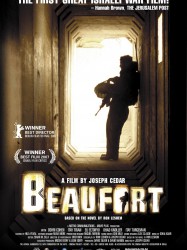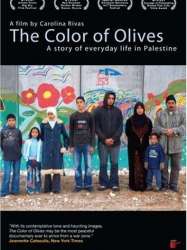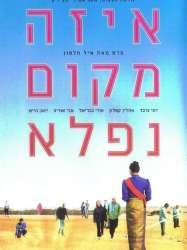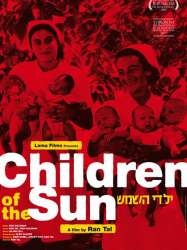Les films ayant pour origine le pays "israel", triés par recette

Noodle (2007)
, 1h30Origine Israel
Genres Drame
Thèmes Religion, Religion juive
Acteurs Mili Avital, Alon Abutbul
When the Chinese woman working in Israel for Miri Kalderon, an Israeli flight attendant, is suddenly deported for overstaying her work visa, her lack of Hebrew-language skills makes it impossible for her to convince the Israeli authorities that she has a young child with her. Miri, twice-widowed because of the ongoing Arab-Israeli wars, has been going through the motions of living, somehow detached from a real connection to life itself. Her decision to help reunite the child—nicknamed "Noodle"—with his mother, now back in Beijing, ends up helping her, not just the boy and his mother, in ways Miri herself could not have expected.

Japan Japan (2007)
, 1h5Origine Israel
Genres Drame
Thèmes Religion, Sexualité, Homosexualité, Religion juive, LGBT, LGBT et la religion, LGBT
The film tells the story of Imri, who at 19 goes to live in Tel Aviv, but dreams of moving to Japan. Through his relationships and encounters and in diverse cinematic tools, we are introduced to the young man's life. An exploration of living in the exotic city of Tel Aviv is presented through a hero who is himself in the midst of exploring his own choice of an exotic place. A unique correlation is formed between the hero's misconception of Japan and ours of him. The movie was constructed by both improvised and pre-scripted scenes, as required by the nature of each scene.

Beaufort (2007)
, 2h11Réalisé par Joseph Cedar
Origine Israel
Genres Drame, Guerre, Historique
Thèmes Afrique post-coloniale, Religion, Politique, Religion juive
Acteurs Alon Abutbul, Itay Tiran, Ohad Knoller, Oshri Cohen
Beaufort raconte les derniers jours du poste d'observation placé au sommet de la forteresse, avant l'évacuation du Liban par l'armée israélienne en 2000. Liraz Lebrati, l'officier chargé de cette position doit faire face à l'incompréhension de son unité, qui ne comprend plus l'utilité de leur mission, tout en respectant les directives qu'il reçoit de ses officiers supérieurs, de maintenir leur présence. La forteresse fait en effet l'objet d'attaques de mortiers ou de tirs de missiles quotidiens, sans que l'unité qui la défend ne puisse répondre aux tirs.

ואהבת (2007)
, 29minutesOrigine Israel
Genres Drame
Thèmes Religion, Sexualité, Homosexualité, Religion juive, LGBT, LGBT et la religion, LGBT
Ohad, the protagonist, is serving in the Israel Defense Forces as a Hesder student. He has not told anyone that he is gay. He tries various ways of dealing with the conflict between his religious beliefs and his sexual orientation, including Atzat Nefesh. He is told to spend forty days fasting and repenting to help rid him of his homosexual inclinations. He does this and believes himself to be cured.

海と夕陽と彼女の涙 ストロベリーフィールズ (2006)
, 1hOrigine Israel
Genres Drame, Documentaire, Fantasy
Thèmes Afrique post-coloniale, L'environnement, Religion, Documentaire sur le monde des affaires, Documentaire sur le droit, Documentaire sur l'environnement, Documentaire sur la guerre, Documentaire historique, Documentaire sur une personnalité, Documentaire sur la politique, Documentaire sur la religion, Politique, Religion juive
Acteurs Mitsuki Tanimura, Yuria Haga
Strawberry Fields points out that strawberries grown in Gaza are the only agricultural product marketed internationally as being of Palestinian origin. One of the major Gaza strawberry farms in located at Beit Lahiya. More than 1,500 tons of strawberries are exported from Gaza to Europe through the Israeli company Agrexco. In order to get overseas, however, the fruits need to pass through the checkpoint that separates Israel and Gaza. The 2005–2006 growing season coincided with the Israel's disengagement from Gaza and the rise of Hamas as the ruling political entity. The armed conflict between Israel and Hamas resulted in the closing of the border checkpoint. The strawberries grown at Beit Lahiya cannot leave Gaza, resulting in significant losses for the farmers and their Agrexco partners. Unable to transport their produce, the farmers have no choice but to dispose of their crop and prepare for the following year’s growing season.

...More Than 1000 Words (2006)
, 1h18Origine Israel
Genres Documentaire
Thèmes Afrique post-coloniale, Religion, Documentaire sur l'art, Documentaire sur le droit, Documentaire sur la guerre, Documentaire historique, Documentaire sur une personnalité, Documentaire sur la politique, Documentaire sur la religion, Politique, Religion juive
Acteurs Galit Gutmann

The.Galil.Eskimosim (2010)
, 1h35Origine Israel
Genres Drame, Comédie
Thèmes Religion, Religion juive
Acteurs Mosko Alkalai
When the bank forecloses on the property of an isolated and financially troubled kibbutz in Galilee, Israel, most of the residents gather their belongings and abandon the community before the bailiffs arrive. In their haste to depart, however, they neglect to bring with them a dozen senior citizens who now are forced to fend for themselves as they attempt to oppose the construction of a luxury spa and casino and save their kibbutz single-handedly. In the process, they rediscover the pioneering spirit they felt when the kibbutz was first established.

El color de los olivos (2006)
, 1h37Réalisé par Carolina Rivas
Origine Israel
Genres Documentaire
Thèmes Afrique post-coloniale, La famille, Religion, Documentaire sur le droit, Documentaire sur la guerre, Documentaire historique, Documentaire sur une personnalité, Documentaire sur la politique, Documentaire sur la religion, Politique, Religion juive

Women for Sale (2005)
, 56minutesRéalisé par Nili Tal
Origine Israel
Genres Documentaire
Thèmes Religion, Sexualité, Erotique, Prostitution, Documentaire sur la prostitution, Documentaire sur la religion, Religion juive

What a Wonderful Place (2005)
, 1h44Réalisé par Eyal Halfon
Origine Israel
Genres Drame
Thèmes Religion, Religion juive
Acteurs Uri Gavriel, Dvir Benedek

Say Amen (2005)
, 1h5Origine Israel
Genres Documentaire
Thèmes Religion, Sexualité, Homosexualité, Documentaire sur l'homosexualité, Documentaire sur la religion, Religion juive, LGBT, LGBT et la religion, LGBT

Next Year in Argentina (2005)
, 1h2Origine Israel
Genres Documentaire
Thèmes Religion, Documentaire sur la religion, Religion juive

At the Green Line (2005)
, 52minutesOrigine Israel
Genres Documentaire
Thèmes Afrique post-coloniale, Religion, Documentaire sur le droit, Documentaire sur la guerre, Documentaire historique, Documentaire sur une personnalité, Documentaire sur la politique, Documentaire sur la religion, Politique, Religion juive
 Connexion
Connexion
